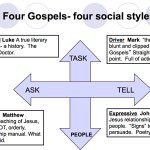I have blogged from the top of the Eiffel tower before, but this post was mostly written from the top of the world, although I could not post it until my return to the UK. I finally got a chance to listen to D. A. Carson on the New Perspectives on Paul during a flight in the last few days. Carson is engaging to listen to, and sheds great light on this important subject.
Carson began by explaining that Stendall had begun the whole move by arguing that Westerners have read their own preoccupation with the problem of guilt back into the NT rather than from it. Although at the time this was widely dismissed by evangelicals, subsequent work by Sanders and others has succeeded in building a theology which alters dramatically the view of sin, law, grace, and justification.
E. P. Sanders, Carson goes on to say, criticized the ascribing of later Jewish views (e.g. from the Babylonian Talmud) to first century Judaism. He argues that Judaism in the first century was not legalistic in the way we understand Paul portrayed it.
In fact, Sanders put forward eight points which he called covenantal nominism, which he believed was the only theology discernible from first century writings. These eight points did not, in Sanders view, differ dramatically from what Paul himself taught in the Epistles. These eight points are as follows:
- God has chosen Israel.
- He has given them the law.
- God promised to elect.
- They had a duty to obey.
- Punishment and reward are on the basis of works.
- Means of atonement is provided in the law (animal sacrifice).
- Covenantal relationships are thus maintained.
- All will be saved who maintain covenantal relationships.
Sanders, according to Carson, argues this is very similar to Pauline theology, and that the heart of the change is not law versus grace, but rather who Jesus was.
Carson then explains that Dunn argued that the separation between Jews and Christians was not legalism, but a kind of nationalism. Thus, according to Dunn, when Paul spoke of works of the law, he always referred to the boundary markers; e.g. circumcision, sabbath, food, etc. Dunn believed that the single issue was that Paul wanted one people, Jew and Gentile. According to Carson, Dunn has modified that position and now acknowledges that works of law in Paul are not always boundary markers; thus, there has to be another issue.
Those who believe the “New Perspectives” heavily criticize the reformers, saying they created the first century Jew in the image of pre-Reformation Catholicism.
It may be true that in their own writings first century Jews were not legalistic. But, in my humble opinion, that doesn’t mean that they were not legalistic. My view is that legalism is endemic in the minds of mankind, whatever their official theoretical view may be. It may be that Jewish writings did not always reflect legalism; that does not mean that peoples’ actual belief and heart attitudes did not reflect legalism. Anyone who has spent time observing evangelical churches will know that legalism can take root even where grace is nominally proclaimed. I have seen many Christians over the years who claim to believe the gospel of grace, but are secretly struggling with the twin evils of legalism—superior self-righteousness when the struggle against sin is going well and hopeless condemnation when it isn’t.
But Carson tells us that legalism was not so absent from Judaism of the time. He cites Josephus (if anyone can source references for this I would be grateful) who asks the question, “Who does God pour his grace out on—those who deserve it or those who don’t?” Josephus answers his own question: “Those who do—or else he would be unjust.” This is a clear example of legalism. Thus, at the very least we should acknowledge that there was a variety of views present at the time of Paul.
It is all too easy to say that you believe in salvation by grace, but secretly believe, along with Josephus, that grace is poured out on those who in some way deserve it.
Justification is closely tied to justice biblically, not covenantal faithfulness. The OT narrative leads to the conclusion that we are all a bunch of hopeless sinners, and without the New seems rather hopeless to me. King David, for example, was a man after God’s own heart, and yet committed adultery and murder. Carson says, “One wonders what he would have done if he wasn’t a man after God’s own heart!”
Paul is very clearly dealing with individual guilt, not the corporate responsibility some would have us believe. “There is none righteous, not one.”
Thus, while I accept that, as with the discussions over Chalke’s critique of penal substitution, there is supplementary value in other models, they must not, in my view, replace the traditional gospel.
I have a great deal of skepticism of any theological view that does not naturally arise from the biblical texts. As helpful as scholars can be, the Bible was written for the common man. Much of it (especially the Epistles) is a bit like listening to one side of a telephone conversation. God knew that when he designed the Bible as a book for all time and all peoples. Thus, scholars should enrich our understanding of the Bible rather than generally contradict the message that comes across loud and clear to English readers. I am skeptical of any theological position that depends on extensive word studies to try and prove that individual words didn’t mean what we think they did.
In fact, due to the principle of redundancy in communication, our theologies ought to be able to survive a random elimination of words or even whole verses in the Bible. Thus, if a theology rests on a single word, I would argue what if that word were deleted from the Bible, what conclusions would we come to then? The clear message of the Bible is not dependent on any one word in it.
We study the WHOLE Bible, and to my mind, it is full of references to sin, judgment, punishment for sin, guilt, and redemption by paying a cost or a sacrifice. I remain confident in traditional interpretations of the gospel and challenge any of my readers to undermine such understandings without the use of Greek lexicons to try and change the meaning of words.

















